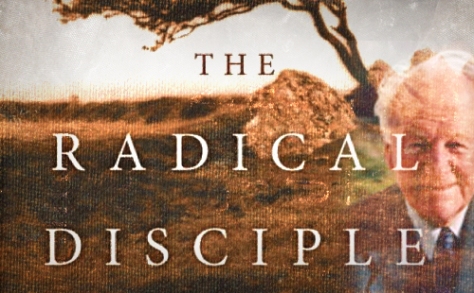I haven’t been reading as much as I’d like the last couple of weeks, but what I have been reading is great. Over the course of the last week or so, I wrote a blog series called “The Disciplines of a Multiplying Youth Pastor,” which was adapted from the disciples of a multiplier that Liz Wiseman lays out in her book, Multipliers. It is a great book, and I would recommend it to anyone who is or hopes to be involved in a leadership role.
In addition to reading Multipliers, I recently started reading a little book by John Stott called The Radical Disciple, and no, this book doesn’t have anything to do with David Platt‘s best-selling book, Radical. I have never read anything by Stott before, but so far I have been blessed by what he has taught me through his thoughts in this volume.
The Radical Disciple is a great little book on, as its subtitle details, “Some neglected aspects of our calling.”
I am only about halfway through the book, but one of my favorite parts so far is in the chapter on “Christlikeness,” which, I think, is easily one of the most neglected aspects of the Christian faith in American Christianity today.
Too often, Christians compromise their consciences on behalf on cultural relevance without taking into consideration the crux of the Christian life: Christlikeness.
Within the realm of evangelicalism, I am by no means a prude, but I do find the extent to which believers are willing to forsake sanctification for the sake of “fitting in” or otherwise. Christlikeness is important. The pursuit of holiness is not inherently legalistic and in a culture today where any claim of absolution is synonymous with hate, many Christians are hesitant to be holy for fear that it may burn bridges with unbelievers.
Our biblical call to Christlikeness (Phil 1:27; 1 Pet 1:13) cannot be hindered by our desire to reach the unbelieving in our communities. The pursuit of holiness and the making of disciples are not mutually exclusive endeavors.
In addition to not letting cultural relevancy hinder our desire for Christlikeness, we must not let our own sin prevent us from trying to become more like Christ. We cannot grow into the righteousness that was bought for us on the cross on our own—we need the Holy Spirit, the Helper, that is within us.
This is where Stott comes in. I think he illustrates this point beautifully in The Radical Disciple.
It is no good giving me a play like Hamlet or King Lear, and telling me to write a play like that. Shakespeare could do it; I can;t.
And it is no good showing me a life like the life of Jesus and telling me to live a life like that. Jesus could do it; I can’t.
But if the genius of Shakespeare could come and live in me, then I could write plays like his.
And if the Spirit of Jesus could come and live in me, then I could live a life like his.
God’s purpose is to make us like Christ, and God’s way is to fill us with the Holy Spirit.
We cannot rely on ourselves for our sanctification. The Holy Spirit that God has given us gives us the ability to reflect Christ to the world increasingly so throughout our lives as ambassadors on this earth.
Stop sacrificing Christlikeness on the altar of cultural relevance—find a way to bring the two closer together.
